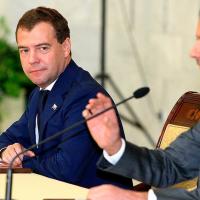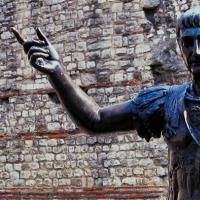Composer Glinka. About his life, work and love affairs.


Mikhail Ivanovich Glinka (1804-1857) - composer, considered one of the founders of Russian classical music.
Born in the village of Novospasskoye, Smolensk province, on the estate of his father, a retired captain. Until the age of six, he was brought up by his grandmother, who completely removed Mikhail's mother from raising her son. Mikhail grew up nervous, suspicious and sickly baric-hard-to-reach - "mimosa", according to his own characteristics. Fortunately for the boy, an upbringing that threatened to turn him into
miserable, pampered undergrowth, was interrupted by the death of his grandmother. At the age of ten he began to learn to play the piano and violin.
In 1817 - 1822 Glinka studied in St. Petersburg at the Noble Boarding School (his tutor was V. K. Kyuchelbecker) and without much difficulty was among the best students. In the boarding house, Glinka meets A. S. Pushkin, who came there to his younger brother Lev, Mikhail's classmate. Their meetings resumed in the summer of 1828 and continued until the death of the poet. Then Glinka
met Griboedov, Zhukovsky, Mitskevich.
On the advice of doctors, Glinka went abroad in 1830. For four years he lived in Germany and Italy, where he wrote romances and studied musical theory. In 1834, having received news of his father's death, he returned to Russia.
In 1834-1836 Glinka worked on the opera Ivan Susanin. Shortly before the premiere, the title was changed by Nicholas I to the tendentious Life for the Tsar. The opera was a huge success, and Glinka's fame was finally strengthened, as evidenced by his appointment to the post of Kapellmeister of the Court Singing Chapel (1837 - 1839).
In 1838 Glinka traveled to the Ukraine to recruit choristers and began to write the opera Ruslan and Lyudmila "piece by piece and snatches", completed in 1842.
Glinka consolidated his fame by writing many wonderful works, including a romance based on Pushkin's poems "I Remember a Wonderful Moment", "Spanish Overtures", "Waltz Fantasy", "Kamarinskaya".
In the last period of Glinka's life, for the most part, he lived abroad.
In January 1857, a concert was held in Berlin, where Glinka's works were performed, which were a huge success. Excited, Glinka went outside and caught a cold. The disease turned out to be fatal. The ashes of Glinka were transported to St. Petersburg and buried in the cemetery of the Alexander Nevsky Lavra.
The patriotic song of Mikhail Glinka in the period from 1991 to 2000 was the official anthem of the Russian Federation.
True, no one seriously believed that Glinka would be distracted from his chords even for a minute and take up his personal life. However, in 1835, Mikhail Ivanovich's relatives were shocked by the unexpected news of his marriage to a certain Maria Petrovna Ivanova, a relative of one of his acquaintances. Everyone who knew Glinka was surprised by the choice of the bride. “Michel married a certain young lady Ivanova,
a young lady without a fortune and without education, not at all pretty, and who, on top of everything, hates music, ”friends and relatives gossiped. But it seemed to Glinka that he had found his happiness. “In addition to a kind and pure heart,” Glinka writes to her mother immediately after her marriage, “I managed to notice in her the properties that I always wanted to find in my wife: order and frugality. Despite her youth and vivacity of character, she is very reasonable and
extremely moderate in desires. But Mikhail Ivanovich's enthusiasm did not last long. A few months after the wedding, he realized that he had married a woman who was not interested in anything but beautiful outfits and a chic departure. Which, instead of taking care of her husband, harasses him with petty nit-picking. The couple began to quarrel, Glinka tried to be at home as little as possible.
And 4 years after the wedding, in 1839, Glinka found out what all of Petersburg had been talking about for a long time: his wife was almost openly cheating on him. After a stormy showdown, Mikhail Ivanovich packed his things and left home.
After parting with his wife, Glinka fell in love with visiting the house of his sister Maria Ivanovna. She lived in St. Petersburg at the Smolny Institute, where her husband served. Once, when Mikhail Ivanovich was visiting his sister, her friend, a young teacher Ekaterina Ermolaevna Kern, the daughter of the same Anna Kern, whom Pushkin was so passionate about, dropped in on her. He himself did not notice how, at the age of 35, he fell in love with a girl 14 years younger than himself. Feelings completely overwhelmed both. In that year, Glinka wrote his famous romance based on Pushkin's poems "I Remember a Wonderful Moment", dedicated to Anna Kern. The poet wrote poems to his mother, and the composer dedicated the music to her daughter.
However, Glinka was still officially married. But in 1841 a scandal erupted, which gave Ekaterina Kern the hope of becoming the composer's wife. Mikhail Ivanovich learned that his wife had secretly married the cornet Nikolai Vasilchikov, the nephew of one of the court ministers. At that time, divorce was allowed if the betrayal of one of the spouses was proven. Glinka started the divorce proceedings. Mikhail Ivanovich was sure that his case would be resolved quickly and soon he would be able to marry Ekaterina Ermolaevna, but thanks to his connections, Cornet Vasilchikov's uncle managed to make the trial take an unexpected turn. The priest who performed the wedding ceremony said that he was bribed by Mikhail Ivanovich Glinka, who wanted to get rid of his wife. The case is dragging on. Ekaterina Kern, being pregnant, constantly cries and demands decisive action from Mikhail Ivanovich. And he decides - he gives her a significant amount for "liberation" (this word in those days meant abortion). Mikhail Ivanovich himself was very worried about what had happened. He consoled Ekaterina Ermolaevna as best he could and promised to marry as soon as
court cases will be completed.
The divorce was obtained only in 1847. It would seem that now nothing could interfere with their happiness. But, having received such a desired freedom, Mikhail Ivanovich was at a loss - he was afraid to tie the knot again. Quarrels began. "My ideal has collapsed," Glinka wrote to his mother.
For a long time, Ekaterina Ermolaevna did not lose hope for the composer's return, she kept his letters. Only 7 years after the break with Glinka, 36-year-old Ekaterina Kern got married.
Mikhail Ivanovich lived the rest of his life as a bachelor. Ekaterina Kern survived him by 47 years and died at the age of 86.


